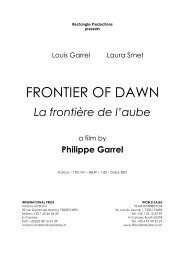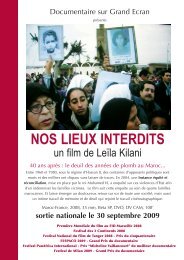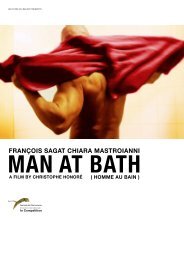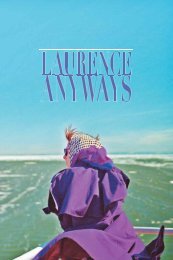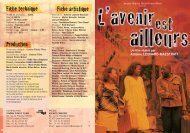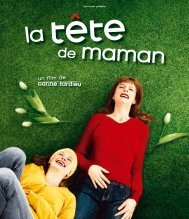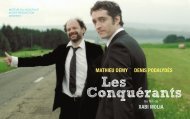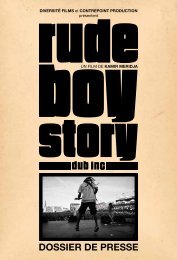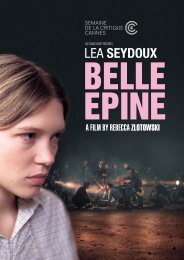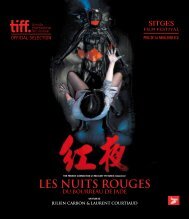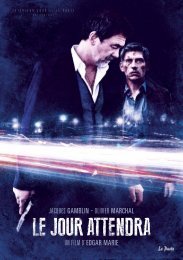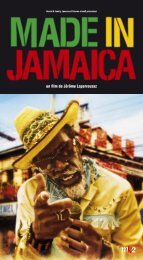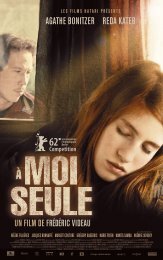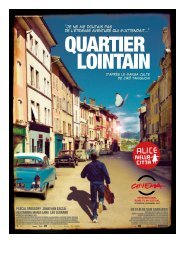A FILM BY
A FILM BY - Unifrance
A FILM BY - Unifrance
- No tags were found...
You also want an ePaper? Increase the reach of your titles
YUMPU automatically turns print PDFs into web optimized ePapers that Google loves.
PAULO BRANCO PRESENTS<br />
A <strong>FILM</strong> <strong>BY</strong><br />
© ALFAMA <strong>FILM</strong>S - Photos : Philippe Quaisse - Nicolas Ploux
OUR<br />
PARADISE<br />
A film by GAËL MOREL<br />
With<br />
STÉPHANE RIDEAU<br />
DIMITRI DURDAINE<br />
BÉATRICE DALLE<br />
DIDIER FLAMAND<br />
Produced and distributed by<br />
ALFAMA <strong>FILM</strong>S<br />
FRENCH RELEASE<br />
28 TH SEPTEMBER 2011
CAST<br />
Vassili......................Stéphane Rideau<br />
Angelo.....................Dimitri Durdaine<br />
Anna........................Béatrice Dalle<br />
Victor.......................Didier Flamand<br />
First customer.........Jean-Christophe Bouvet<br />
Anna’s mother.........Raymonde Bronstein<br />
Kamel......................Malik Issolah<br />
Little Vassili.............Mathis Morisset<br />
INTERNATIONAL<br />
SALES<br />
ALFAMA <strong>FILM</strong>S<br />
Frédérique Rouault<br />
176 rue du temple 75003 PARIS<br />
Tel : 01.42.01.84.76 Fax : 01.42.01.08.30<br />
frederique.alfamafilms@orange.fr<br />
TECHNICAL<br />
CREW<br />
Screenplay - Gaël Morel<br />
Original music - Camille Rocailleux<br />
Photography - Nicolas Dixmier<br />
Art direction - Zé Branco<br />
Editing - Catherine Schwartz<br />
Sound - Nicolas Waschkowski, Corinne<br />
Rozenberg, Marie Deroudille and Hervé Buirette<br />
Production management - Thierry Cretagne<br />
A coproduction ALFAMA <strong>FILM</strong>S<br />
and RHÔNE-ALPES CINEMA<br />
With the participation of<br />
REGION RHONE-ALPES and CNC<br />
Associated production CLAP <strong>FILM</strong>ES<br />
With the support of the PROCIREP<br />
Produced by Paulo Branco<br />
Distributed by ALFAMA <strong>FILM</strong>S<br />
TECHNICAL<br />
CHARACTERISTICS<br />
Running time : 100 min<br />
Format : 1.85<br />
Sound : 5.1<br />
Visa : 123.438
SYNOPSIS<br />
Vassili, an ageing prostitute, who suffers from<br />
criminal drives, finds an unconscious young man<br />
in the Bois de Boulogne and puts him up at his<br />
place. Both men, now accomplices and lovers,<br />
prostitute themselves and get used to robbing<br />
their customers. However, little by little, the noose<br />
tightens. After threats of retaliation, the couple<br />
has to flee from Paris. The runaway begins.
INTERVIEW<br />
WITH GAËL MOREL<br />
DARKNESS IN TECHNICOLOR<br />
“ Even accomplished, evil retains some<br />
unreal quality; perhaps this explains the<br />
simplicity of criminals; everything is simple<br />
in a dream ”<br />
SIMONE WEIL<br />
J G : Vassili, the serial killer embodied by<br />
Stéphane Rideau, kills without any explanation.<br />
That was already the case for the character of the<br />
infanticidal mother in your previous movie, New<br />
Wave.<br />
G M : I try not to limit my characters. A character<br />
who kills is unfathomable, he is undetermined, as<br />
it is often the case in my movies. That is why, most<br />
of the time, my dialogues are rather factual than<br />
introspective.<br />
- Psychology would be “the hero’s tomb” as Cioran<br />
puts it?<br />
- My reference is Brett Easton Ellis and new American<br />
literature in general: in Dennis Cooper’s work for<br />
instance, the absence of past for the characters does<br />
not destroy fiction, on the contrary. They are heroes,<br />
not because they are easily solved or positive,<br />
but because they are following an itinerary. In the<br />
greatest model of literature, Crime and Punishment,<br />
Raskolnikov’s motives for killing remain unknown.<br />
What Dostoïevski explains is what happens within<br />
him after the crime, its consequences<br />
If a golden rule in life is to leave an incomplete image<br />
of oneself, I like it to be the case for a character’s<br />
life. In movies such as Bonnie and Clyde or The<br />
Honeymoon killers, not knowing anything about a<br />
character stimulates fiction. This share of darkness<br />
allows the audience to find a refuge, to project<br />
themselves – not that I want to turn them into an<br />
active audience but it’s the best way to experience<br />
empathy for a hardly acceptable character.<br />
And this is the opposite of gratuitous violence.<br />
SEXUAL APPETITE<br />
- But it could be perceived as such. Don’t you fear<br />
that by showing a homosexual , who is both a serial<br />
killer and a prostitute, and whose motives you do<br />
not explain, you will be blamed for displaying a<br />
negative image of homosexuality ?<br />
- I consider that homosexuality belongs to the<br />
sphere of sexuality and not to the social sphere. In<br />
movies, and in television programs (Plus belle la<br />
vie, Avocats et associés – French TV shows), it is<br />
experienced by men who work, who go home at<br />
night, etc. Whereas, even if that is the case, their<br />
sexual reality, where TV can never venture, is very<br />
different - countless nightclubs, places to flirt…<br />
I designed my movie as a reaction against the<br />
normative representation of our present society, a<br />
representation to which I bring a sexual answer. I<br />
suggest to a homosexual audience that they identify<br />
with a villain. No woman would agree to be showed<br />
in a movie in such a domestic way<br />
But I never show this sexual desire in a negative<br />
way- the scene of the “threesome” at Vassili’s is the<br />
happiest sex scene of the movie.<br />
- Every character in the movie has a problem with<br />
age - not only the killer, and not only homosexuals<br />
since Anna/Béatrice Dalle is having affairs with<br />
teenagers.<br />
- This has often been the case in my movies. To take<br />
a single example, in After him, Catherine Deneuve,<br />
by losing her son, also loses her youth, and starts<br />
befriending post-teenager young people. In Our<br />
paradise, the homosexual circle, in which you are<br />
perceived as old at forty, enables me to deepen that<br />
idea. It is indeed a circle in which whatever your social<br />
function is, you don’t have family responsibilities<br />
that make you age de facto. There, sexuality is very<br />
adolescent and it is one of the reasons why youth is<br />
lusted after so much. Lusted after and not necessarily<br />
respected, a fact for which Vassili, who hunts and<br />
judges, puts the blame on his predators. One of the<br />
essential cues of the movie, in my opinion, is the very<br />
simple one uttered by the perverted doctor : “An old
queer like me must come up with other pleasures”.<br />
Presumably, old heterosexuals must do so as well,<br />
but this phenomenon is tragically – and sometimes<br />
comically- heightened for homosexuals.<br />
DARK HOLE<br />
- We are aware of your passion for actors and<br />
actresses. Nevertheless, I notice that both<br />
principal actors, Stéphane Rideau and Dimitri<br />
Durdaine who acts for the first time in this movie,<br />
come from a non-professional background … Is<br />
that a choice?<br />
- First of all, concerning Stéphane Rideau, what<br />
you recall is very old. But it is true that he is an<br />
atypical actor. This part was a matter of trust- of me<br />
trusting him and him trusting me. Immediately, not<br />
only did Stéphane accept everything but he wanted<br />
everything. As if he already had the character within<br />
him, he did not have to put himself in the shoes of a<br />
killer. Stéphane is the ideal actor.<br />
As far as the character of the young Angelo is<br />
concerned, we quickly found out that it was not<br />
a part we should give to an actor. An actor would<br />
have liked to add intentions, which is natural. And<br />
many people did so during the casting. But I wanted<br />
someone whose youth did not commit for the sake<br />
of a great cause, even if it was the one of the cinema!<br />
Tenderness and trust exist everywhere – including<br />
in the relationship with a killer. Angelo had to be<br />
completely passive. He only had to know his lines<br />
well and to remain in his marks. Compared with<br />
other young people, Dimitri Durdaine possesses<br />
something very modern in his physical appearance<br />
and something eternal in reality : this smooth and<br />
soft quality, which Edith Piaf talked about in Le Brun<br />
et le Blond, is a shell, a defense, that makes him<br />
impenetrable, the opposite of acting performance.<br />
In the manner of characters in Dennis Cooper’s<br />
novels or in Greg Araki’s movies, who turn out to<br />
be abysses when confronted to a disaster. This dark<br />
hole, the power of attraction and destruction of the<br />
blond Dimitri expressed it ideally. He was found in<br />
extremis, at the end of a long casting which went on<br />
for months where the risk of overdoing the part was<br />
general. This is a future actor!<br />
- And above all, you were looking for a presence.<br />
- I hate it when an actor fakes his idiosyncrasy. A<br />
presence is a figure, a voice, a gaze, and as Bresson<br />
staged it in Le Diable probablement, a gait. These<br />
are things quickly identifiable in someone. The<br />
presence of an actor is measured by the singularity<br />
of these four elements, for instance Deneuve, Cassel,<br />
Depardieu, Delon, Dalle…!<br />
- Béatrice Dalle, precisely. You must have been<br />
very meticulous in the screenplay, because her<br />
arrival in the movie does not distract the attention<br />
of the audience from the duet Vassili/Angelo.<br />
- She and her ten year old child displace, refocus the<br />
axis of vision over on the two boys. As a reasonable<br />
mother but a shady woman, she allows us to<br />
question the status of Vassili as a killer since he<br />
becomes paternal and protective with her son.<br />
- It is your second movie with Béatrice Dalle.<br />
- I was enthused by the creation of the unexpected<br />
couple Béatrice Dalle/Stéphane Rideau, each of<br />
them an icon in his own way. Seeing these two<br />
icons on which time has passed perfectly restores<br />
the impression of two adults waking up too late from<br />
their teenage hood.<br />
MIMETIC DESIRE<br />
- She always wears black and nevertheless<br />
she is radiant. This also applies to the totality<br />
of this dark movie which is filled with colours<br />
and light, as always with you. I cannot decide<br />
between Caravaggio’s intense chiaroscuros and<br />
Michelangelo’s vivid brightness.<br />
- I leave you with the responsibility of these<br />
references! All I can say is that the work on colour<br />
is the very function that I attribute to shots. It is on<br />
the setting – like a painter, possibly- that I choose<br />
perspective, areas where matter is present (brilliancy,<br />
clothes, stones, snow…)<br />
I always imagine a shot on a physical background.<br />
This is particularly visible during crime scenes. I<br />
don’t want to repeat myself, to be redundant, or in
a nutshell, to be emphatic. That would boil down<br />
to using dark colours a dark movie, in lighting<br />
characters that I wish to stay in the shadow with<br />
dark colours . Ideally, I would like to render this<br />
darkness and this shade in Technicolor.<br />
- Let’s mention the colour red... Many images of<br />
blood are very aggressive, not to say artificial like<br />
in all your movies, like in Aldrich’s movies. Does<br />
blood fascinate you ?<br />
- Blood is like violence. In life, in the street, the<br />
coarseness of violence always seems petty to me.<br />
You can interpret my use of blood the way you want<br />
(don’t forget the collection of blood packs at the<br />
doctor’s) but just as for violence, I try to endow it<br />
with beauty by staging it.<br />
- For that matter, you generally demonstrate a<br />
strong wariness concerning naturalistic cinema.<br />
- No, that is not what I mean. There is a naturalistic<br />
tradition in French cinema which has become a sort<br />
of norm, I have nothing against it but I have always<br />
defined myself out of it. What I said earlier about<br />
homosexuality affects all my characters; they must<br />
not be stereotypes of their milieu. They evolve in<br />
a circle but they do not embody it. With Faulkner,<br />
I have learnt to define my characters through<br />
discrepancies in the story, resorting to the possible,<br />
rather than reproducing reality in a plausible way.<br />
- For instance?<br />
- Gazes. Staging the audience’s gaze, as Hitchcock<br />
used to put it and characters gazing at each other.<br />
In Zombie by Brett Easton Ellis, as with Fassbinder,<br />
the story keeps resorting to gazes, rather than to<br />
the plot. In the first scene of Our Paradise, we wait<br />
a long time to see Jean Christophe Bouvet but we<br />
hear him while watching the Stéphane Rideau’s<br />
gaze. Until the movie’s denouement, when the child<br />
watches the double crime and when he is watched in<br />
the act of seeing it, I multiplied scenes of gazing. The<br />
most surprising one for the audience is presumably<br />
the one with the webcam where, while we believe<br />
to be attending a new love scene between the<br />
characters, a sequence shot leads to the want ad on<br />
the computer. Yes, I like stylized movies and stylized<br />
movie directors.<br />
- Since the beginning of the interview, you have<br />
often referred to models, as literary as cinematic.<br />
An artist who dismisses models, said Gide, only<br />
demonstrates his fear of not measuring up to<br />
them, and displays a mortal weakness.<br />
- Mimetic desire is creative. I don’t believe in<br />
spontaneous generation, the desire to make a movie<br />
comes from a movie we strongly appreciated. But<br />
nothing is as personal as a stylization. What I claim<br />
is the affiliation to a family, not the copy of previous<br />
stylizations.<br />
- For instance?<br />
- In France, I feel related to very diverse aesthetic<br />
propositions from directors such as Ozon, Honoré<br />
or Civeyrac. My cult movies which spurred me on<br />
before this last shooting are Natural Born Killers, My<br />
Own Private Idaho and The Honeymoon Killers.<br />
A COMMANDO OPERATION<br />
- Movies with a huge budget. Whereas Our Paradise<br />
was directed with limited expenditure.<br />
- My producer, Paulo Branco had a nice phrase:<br />
“a commando movie”, which exactly defines how<br />
this limit did not narrow us but turned out to be an<br />
exciting adventure. I left for the front in a permanent<br />
state of war, a war where my allies were my crew. –<br />
And even the weather, if we think of the snow at the<br />
end of the movie.<br />
This small budget would have bothered me for a<br />
movie such as After him, but for Our paradise which<br />
cannot be broadcasted on prime time television, I<br />
went as far as my desire led me, and I can say that<br />
I disposed of all the means necessary to reach this<br />
extreme objective.<br />
- Can you explain that?<br />
- Of course, it’s perfectly obvious. I did not trap<br />
myself within machinery, I did not use a dolly, I<br />
limited the amount of travelling, I had no zoom, I<br />
had to conceive my focal lenses more precisely, I<br />
had to conceive my movie with a different cinematic
grammar from my sequence shots; I had to build<br />
my movie differently. This restriction enabled me to<br />
be less paralyzed. I had never felt so free to invent<br />
my shots. I spoke of homosexuality in other movies,<br />
but here, I have the impression that I talk about it<br />
differently, that I knew what I didn’t want.<br />
- And your soldiers held on.<br />
- I wanted to live this adventure with people I felt to<br />
be very strong. Most of them are faithful supporters<br />
who adapted to the situation - for instance, I worked<br />
differently with my editor thanks to eighteen years<br />
of very close collaboration. I changed one essential<br />
person: my chief operator so that he would not<br />
repeat previous reflexes : nevertheless, Nicolas<br />
Dixmier used to be my chief electrician and I was<br />
both very confident and very reassured by his new<br />
function, by his gaze.<br />
interview who thus defines the work of art in<br />
Incidences: “ Strength and softness, control and<br />
grace, logic and abandonment, precision and<br />
poetry”...<br />
We could not put it better. It’s his work that an artist<br />
must order, not the world surrounding him.<br />
Interview by Jacques Grant<br />
EXPOSURE<br />
- We can imagine that the subject of the movie and<br />
the direction of some scenes raised the issue of<br />
censorship.<br />
- The official censorship -16-12 rated movies - is<br />
doing its job, it’s normal even if we can discuss<br />
it. The problem lies elsewhere. We think that we<br />
are free to say everything because nobody exposes<br />
himself. As soon as you expose, you have to deal<br />
with insidious forms of censorship. The first one is<br />
self-censorship on the part of television channels.<br />
The second one is connected to the first one: the<br />
audience’s automatic prudery or wariness. As far as<br />
this is concerned, I grant the utmost significance to<br />
the scene of colonoscopy which can seem unrelated<br />
to the plot, whereas it is central in defining the<br />
identity of the movie. In this scene, not far from<br />
the beginning, we see the image of the interior of<br />
Angelo’s body, whereas we know nothing about<br />
him: it was my way of indicating that we are in a<br />
limitless movie where everything can happen, where<br />
the audience is never better informed, always on the<br />
lookout, never at rest.<br />
- To conclude, I picked out a sentence by the<br />
scandalous homosexual André Gide before our
Téchiné revealed Elodie Bouchez, Stéphane Rideau<br />
and Gaël Morel. The latter quickly gave up acting<br />
to become a director. Our Paradise gets back to<br />
Stéphane Rideau.<br />
Now an ageing prostitute, putting on weight on the<br />
verge of his forties, he observes that customers look<br />
at him in a different manner not to say a shifty one.<br />
When humiliation becomes too powerful, his hatred<br />
impulses climb up to the surface and he can go as<br />
far as killing. He can also kill in the name of his love<br />
for Angelo (the revelation Dimitri Durdaine), his<br />
lover, a prostitute as well, but younger, so young<br />
that he is almost a child. In their runaway, they will<br />
join Anna (the stately Béatrice Dalle) who used to be<br />
the queen of the night (in the Queen...) and who now<br />
tries to raise up her kid. The tranquility she provides<br />
them with for a while, will not be sufficient to quench<br />
their thirst for violence. It is during the sequences<br />
haunted by the idea of ageing and the loss of<br />
seduction that Gael Morel’s perspective becomes<br />
extremely striking [...].<br />
“The torture of Eros and Thanatos, torn between<br />
a perverted innocence and a disquieting maturity<br />
where Stéphane Rideau, as a mesmerizing<br />
black angel, and Béatrice Dalle, as a gorgeous<br />
surrogate mother, escort the radiant beginner,<br />
Dimitri Durdaine”<br />
Le Nouvel Observateur – Xavier Leherpeur, September<br />
29th 2011<br />
“A desperate song yet looking for hope in a runaway.<br />
Certainly, Genet, Jean Louis Bory and Pier Paolo<br />
Pasolini would have enjoyed this cinematic scream<br />
which will leave traces in the memory of those who<br />
like every kind of cinema”<br />
Pariscope – Arno Gaillard, September 28th 2011<br />
Libération, Next – Philippe Azoury, September 2011<br />
”Dark and lyrical, the road movie of two criminal<br />
lovers”<br />
“The gay version of They live by night [...] with a<br />
touch of Claire Denis (I can’t sleep for the neutrality<br />
of judgment and the gift for framing) mixed<br />
with Jacques Nolot (Before I forget for the selfdeprecation)”<br />
“Finding the balance of a movie during its<br />
fabrication defines real film directors. Morel is<br />
definitely one of them”<br />
Les Inrocks – Jean-Baptiste Morain, September 28th 2011<br />
“Its darkness touches you once and for all”<br />
“A devilish movie, Our paradise wants to recapture<br />
the impudence of a marginal cinema, its hard liner<br />
purity”<br />
Télérama – Frédéric Strauss, September 28th 2011
GAEL MOREL<br />
<strong>FILM</strong>OGRAPHY<br />
CINEMA<br />
2011 OUR PARADISE<br />
With Stéphane Rideau, Dimitri Durdaine, Béatrice Dalle, Didier Flamand<br />
2007 AFTER HIM (APRÈS LUI)<br />
With Catherine Deneuve, Guy Marchand, Elodie Bouchez<br />
2004 THREE DANCING SLAVES (LE CLAN)<br />
With Nicolas Cazalé, Stéphane Rideau, Thomas Dumerchez, Salim Kechiouche<br />
2003 UNDER ANOTHER SKY (LES CHEMINS DE L’OUED)<br />
With Nicolas Cazalé, Amira Casar, Mohamed Majd, Kheireddine Defda<br />
1996 FULL SPEED (A TOUTE VITESSE)<br />
With Elodie Bouchez, Stéphane Rideau, Pascal Cervo, Meziane Bardadi<br />
1994 LA VIE À REBOURS<br />
With Stéphane Rideau, Paul Morel, Aurélien Morel<br />
TELEVISION<br />
2008 NEW WAVE<br />
With Béatrice Dalle, Valentin Ducommun, Victor Chambon<br />
1999 PREMIÈRES NEIGES<br />
With Elodie Bouchez, Stéphane Rideau, Aure Atika



